

A place to get away from it all: 5 ways school libraries support student well-being. Students in Australia and around the world have experienced significant challenges this year, including the COVID-19 pandemic and natural disasters.
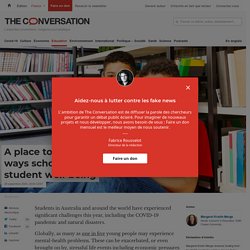
Globally, as many as one in five young people may experience mental-health problems. These can be exacerbated, or even brought on by, stressful life events including economic pressures related to the pandemic. We know teacher librarians and school libraries play an important role in supporting young people’s reading and broader academic achievement. But school libraries play a more diverse role in students’ lives, among which is to support their well-being. Here are five ways they do this. 1. Tandfonline. Full article: How Can School Libraries Support Student Wellbeing? Evidence and Implications for Further Research. Introduction Poor student wellbeing and related mental health issues are of concern, with young people substantially affected (e.g.
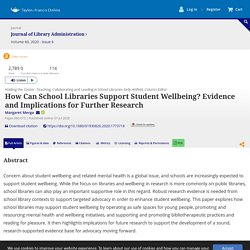
01930826.2020. Full article: How Can School Libraries Support Student Wellbeing? Evidence and Implications for Further Research. Developmental Bibliotherapy – Using Fiction to Help Teens Navigate Adolescence. Bibliotherapy Book Lists. Bibliotherapy Shelf. The Bibliotherapy Book List (100 books) Popular Bibliotherapy Depression Books. Popular Bibliotherapy Depression Books. Bibliotherapy: How reading books can improve mental health. When Sonya Tsakalakis first heard about bibliotherapy, she was intrigued.
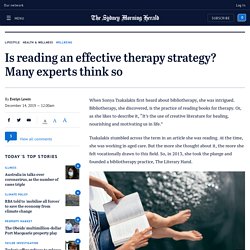
Bibliotherapy, she discovered, is the practice of reading books for therapy. Or, as she likes to describe it, “It’s the use of creative literature for healing, nourishing and motivating us in life.” Tsakalakis stumbled across the term in an article she was reading. At the time, she was working in aged care. But the more she thought about it, the more she felt vocationally drawn to this field. So what does a bibliotherapist actually do? The concept is far from new, with Tsakalakis saying it can be traced back to ancient Greece. Search Results for “bibliotherapy” – Students Need School Libraries. Healing With Books: A Literature Review of Bibliotherapy Used With Children and Youth Who Have Experienced Trauma. Open Access Subscription Access Healing With Books: A Literature Review of Bibliotherapy Used With Children and Youth Who Have Experienced Trauma Dawn De Vries, Zoe Brennan, Melissa Lankin, Rachel Morse, Brandi Rix, Teresa Beck Abstract Bibliotherapy can assist children and youth (3–18 years old) in healing and developing effective coping skills after they experience trauma.
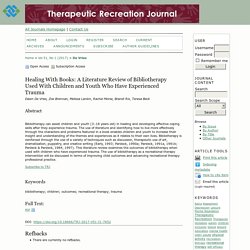
Subscribe to TRJ Keywords bibliotherapy; children; outcomes; recreational therapy; trauma Full Text: DOI: Refbacks There are currently no refbacks. Copyright (c) 2018 Sagamore Publishing LLC. Tools, Publications & Resources. About "The use of books selected on the basis of content in a planned reading program designed to facilitate the recovery of patients suffering from mental illness or emotional disturbance.

Ideally, the process occurs in three phases: personal identification of the reader with a particular character in the recommended work, resulting in psychological catharsis, which leads to rational insight concerning the relevance of the solution suggested in the text to the reader's own experience. Assistance of a trained psychotherapist is advised. " Bibliotherapy: how reading and writing have been healing trauma since World War I. Even as public library services across Britain are cut back, the healing potential of books is increasingly recognised.
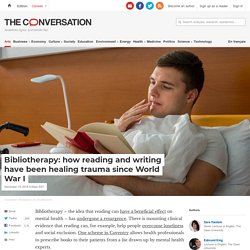
The idea of the healing book has a long history. Key concepts were forged in the crucible of World War I, as nurses, doctors and volunteer librarians grappled with treating soldiers’ minds as well as bodies. The word “bibliotherapy” itself was coined in 1914, by American author and minister Samuel McChord Crothers. Helen Mary Gaskell (1853-1940), a pioneer of “literary caregiving”, wrote about the beginnings of her war library in 1918: Surely many of us lay awake the night after the declaration of War, debating … how best we could help in the coming struggle … Into the mind of the writer came, like a flash, the necessity of providing literature for the sick and wounded. The well-connected Gaskell took her idea to the medical and governmental authorities, gaining official approval. Bibliotherapy: how reading and writing have been healing trauma since World War I.
Developmental Bibliotherapy – An ounce of prevention — National Education Summit. Written by Judith Wakeman If we could design a program for young adults with the aim of boosting good mental health, like a wellbeing vitamin, what would such a program look like?
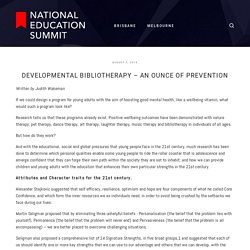
Research tells us that these programs already exist. Positive wellbeing outcomes have been demonstrated with nature therapy, pet therapy, dance therapy, art therapy, laughter therapy, music therapy and bibliotherapy in individuals of all ages. But how do they work? And with the educational, social and global pressures that young people face in the 21st century, much research has been done to determine which personal qualities enable some young people to ride the roller coaster that is adolescence and emerge confident that they can forge their own path within the society they are set to inhabit; and how we can provide children and young adults with the education that enhances their own particular strengths in the 21st century.
Attributes and Character traits for the 21st century. Developmental Bibliotherapy in Young Adult Fiction: Why Teens need books now more than ever — National Education Summit. Young Adult fiction is becoming more edgy, reflecting readers’ demands for stories dealing with these ‘difficult’ and sometimes controversial topics.
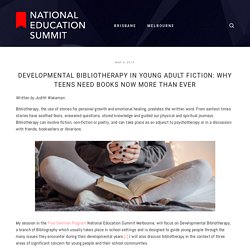
And young adults want to see characters who are empowered, informed and able to build fulfilling lives - developing coping strategies and participating in meaningful relationships even while accepting the setbacks confronting them.